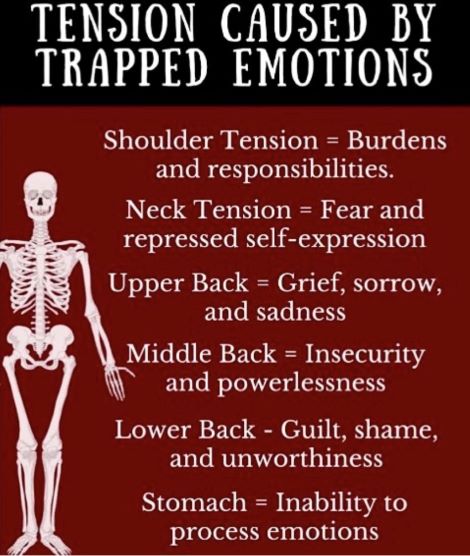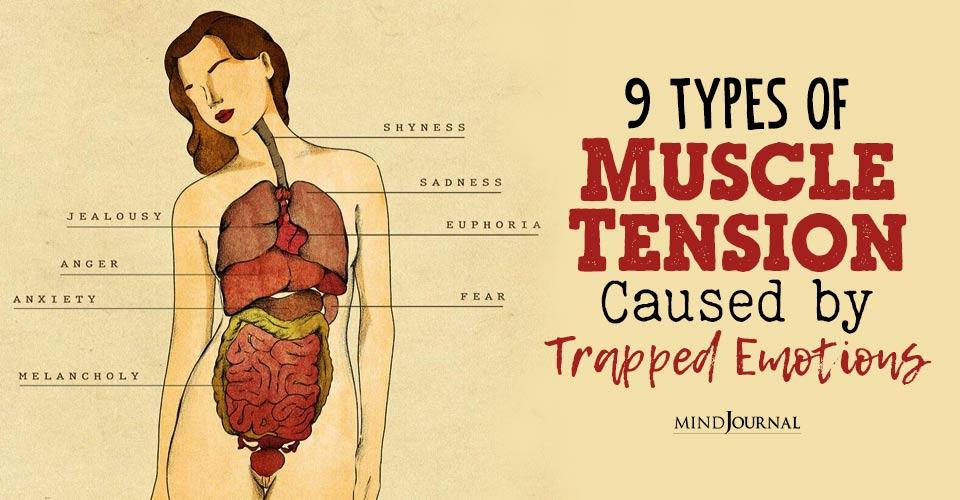Did you know that muscle tension is a reflex reaction to stress, both physical and emotional? Take a look at the types and ways how to reduce muscle tension.
Your body is a map and storage house of every experience you have ever had.
So many of us carry repressed and trapped emotions within multiple areas of our bodies, without even knowing it. In fact, we can go for years, even decades, completely oblivious to the blocked energy our muscles are holding on to.
This repressed energy is responsible for countless ailments and chronic health conditions that cause us great suffering.
The fact is that your body doesn’t forget.
Your body is the most honest and obvious way to access trapped feelings and even traumatic memories. No matter how much you try to ignore, intellectualize or suppress how you feel, your body knows the truth.
If you are struggling with chronic tension in your neck, shoulders, back, thighs, legs, or any other area of your body, this article may help you get to the root of your pain, once and for all.
Related: Is Chiropractic The Mood Booster You’ve Been Looking For?
What Causes Chronic Muscle Tension?
According to various studies and papers, we develop chronic muscle tension as a result of four different causes.
The first cause is social conditioning. Social conditioning starts in early childhood and is reinforced throughout the rest of our lives by our parents, friends, teachers, family members, and society at large.
A lot of the muscle tension that we develop is the result of unspoken social beliefs that we were taught to adopt as a way of being “acceptable” or likable.
For example, many of us were taught that “only babies cry,” so as children, we learned to suppress our tears and sadness in order to “not be a baby.” Many of us were also taught that expressing anger is a “bad” thing as we were punished as children for expressing it.
This form of conditioning is strengthened throughout adulthood, particularly in our workplaces where expressing anger is seen as “unprofessional” and potentially dangerous to our job security.
The second cause of muscle tension is trauma. Traumatic experiences can range from being spanked as a child all the way to extreme violence. Trauma may have been deliberately inflicted on us (e.g. rape or physical assault) or accidental (e.g. a car crash).
When these traumatic experiences aren’t consciously dealt with, they can result in chronic fear, stress, and even occurrences of PTSD.
This chronic anxiety, anger, and grief tend to get stored within the body resulting in muscle tension which contributes to numerous other illnesses such as fibromyalgia, digestive disorders, mental illnesses, and even cancer.
The third cause of muscle tension is psychological tension. Psychological tension is any form of anxiety, frustration, sadness, or anger that we develop as a result of our perceptions.
For example, we may develop psychological tension as a result of our thoughts regarding our coworkers (e.g. they’re lazy) or of us being stuck in traffic (“this shouldn’t happen).
Our automatic tendency to attach to these thoughts and take them seriously is what causes us psychological tension. The more negative, fearful, or fault-finding our perspective is, the more tension we tend to store in our muscles.
The final cause of muscle tension is environmental stressors and habits. For example, our sedentary lifestyles (working at a desk all day) tend to exacerbate our physical pain because we aren’t giving our muscles a chance to expel the tension.
Other habits such as poor posture, lack of sleep, drug use, unhealthy eating, and environmental pollution tend to increase the likelihood of us developing chronic muscle tension.
Related: Spiritual Meaning Of Pain: The Spiritual Meaning Behind Physical Aches, Pain, and Illnesses
Consequences of Chronic Muscle Tension

The field of psychosomatic medicine has conducted numerous studies through the years exploring the mind’s effect on the body, and vice versa.
In terms of muscle tension caused by mental and emotional factors, we tend to experience many health issues:
- Mood disorders (anxiety, depression, SAD)
- Joint pain and increase chance of injury
- Dysmenorrhea (menstruation problems)
- Insomnia
- Skin problems (acne, psoriasis)
- Asthma and hayfever
- Headaches and migraines
- Palpitations and chest pain
- Nausea
- Fibromyalgia
- Irritable Bowel Syndrome
- GI issues (diarrhea, bloating, constipation, cysts)
- Hypertension/High blood pressure
- Sexual dysfunction (premature ejaculation, painful sex)
- Increased tendency towards addictive behavior
This list is by no means complete, and there are many other consequences out there of muscle tension. So if you believe I’ve missed something, please comment below.
Related: Emotional Muscle Memory: How To Release Painful Emotions Trapped In Your Body
9 Types of Muscle Tension Caused By Trapped Emotions
According to a study conducted in 2012, 25.3 million Americans (11.2%) suffer from chronic pain every day and 17.6% suffer from severe levels of pain. This single study reveals a grim reality: so many of us are suffering from muscle tension on a daily basis. Surely there must be a better way to live.
As a person who has struggled with chronic neck and shoulder pain for many years, I was lucky to discover the source of my pain thanks to a healing method known as “floating.”
Thanks to my experience in a float tank (also known as a sensory deprivation tank or isolation tank) I was able to discover that my muscle tension was intimately linked to old memories and repressed emotions.
Lying in the dark, with no sound or sensory input on top of 800 pounds of dissolved Epsom salts, I gradually started feeling my muscles unwind. As each muscle group relaxed and spasmed, thoughts and emotions fired through my head.
For example, as my spine let go into the water, I could feel grief pour through me and memories from childhood run through my mind. I could feel my upper thighs release their contraction as anxiety and loneliness bubbled up through me. I could feel the fear and burden be released from my shoulders and neck area.
Although everyone is different and there are no (known) absolute places in the body where outright emotions are stored, there are certain places which tend to accumulate specific types of emotions.

Below, I want to share with you nine of the most common types of muscle pain and what underlying emotions are connected to them.
1. Shoulder Tension = Burdens and Responsibilities
When we feel weighed down by the stress of life, we tend to accumulate these feelings within our shoulders. Ever heard the expression “carrying the weight of the world on your shoulders”?
Shoulder tension seems to be intimately linked to social and emotional responsibilities, including unconsciously carrying the burden of other people’s pain. As such, many empaths, healers, and caretakers struggle with chronic shoulder muscle tension.
2. Neck Tension = Fear and Repressed Self-Expression
Neck tension is often connected to throat chakra issues such as the inability to communicate clearly or be your authentic self around others.
Fear and anxiety are also frequently stored in this area, particularly as a physical response to danger (as the neck is a vulnerable area) or strange environments. Neck muscle tension is also related to trust issues.
3. Upper Back = Grief, Sorrow, and Sadness
Unexpressed and unreleased sadness tends to build up within the upper back region. As this area is close to the heart, it is also where emotions connected to heartbreak and loss are stored.
For instance, if you carry around grief regarding a loved one or your family at large, you will likely feel tense in this area.
4. Middle Back = Insecurity and Powerlessness
Healing traditions such as reflexology link middle back pain to feelings of helplessness, hopelessness, and insecurity. If you’re feeling unsupported by other people or life, you probably carry tension here.
5. Lower Back = Guilt, Shame, and Unworthiness
Lower back issues often correlate with feelings of low self-worth and lack of self-acceptance. Feelings such as guilt, shame, and even sexual inadequacy or trauma can be stored here as well.
6. Stomach = Inability to Process Emotions
The expression “I can’t stomach it” appropriately describes stomach muscle tension. If your stomach feels stiff or sore, you might struggle to process both negative (and even positive) emotions.
7. Inner Thighs = Fear of Vulnerability
Are you nervous and untrusting around other people? If you struggle with social anxiety, you might also have inner thigh pain. Because our legs are biologically programmed to run when we first spot danger, fear towards others is often stored here.
8. Outer Thighs = Frustration and Impatience
How fast do you live life? The more quickly and mindlessly you live, the more likely you have frustrated and impatient energy stored in your outer thigh muscles. Our jobs and personal lives can also contribute greatly to muscle tension in this area.
9. Buttocks = Anger and Rage
How often do you have to deal with people who are a “pain in the bum”? Anger and suppressed rage are often stored in the buttocks. Pay attention next time you feel your head boil: is your but tensing up as well?
Related: Understanding the Psychology of Chronic Physical Pain
How to Release Trapped Emotions?
Now you may be wondering how to release the muscle tension you have. Here are some tips:
- Allow yourself to “feel it to heal it.” One of the easiest ways to let go of muscle tension is to actively feel and let go of emotions when they come. Of course, this is not always possible, so at the end of every day, make sure you allow yourself the space to feel the emotions you’ve had through the day. Feeling these emotions might involve crying, punching or screaming into a pillow, or any other form of catharsis.
- Adopt an attitude of non-judgment. When we judge our emotions as something “bad” or “wrong,” we actually deepen our suffering and solidify the tension within our muscles. Instead, simply realize that an emotion is an emotion. It doesn’t need to mean anything about you unless you let it.
- Journal about how you feel. Let all of your emotions out in a journal, completely unfiltered. This is a very healing practice if done regularly and is a powerful form of shadow work.
- Be gentle with yourself. Muscle tension tends to add to our negative inner voices which cause us even more tension. To break this cycle of the body feeding the mind and the mind feeding the body, be kind towards yourself. Treat yourself as you would a child or best friend. This practice is a simple but profound way to relax.
- Stretch your muscles. Do simple stretches or try yoga to relax your muscles. Even just five minutes a day is beneficial.
- Breathe deeply. Shallow breathing causes a restriction in air, blood flow, toxin removal, and increased anxiety. Deep breathing stimulates the vagus nerve which calms the mind.
- Try floating. Unless you can afford to go into outer space or an anti-gravity chamber, floating is the only opportunity there is on this planet to experience total weightlessness. “Sensory Deprivation Tanks” may sound daunting, but actually they’re immensely healing and calming. People with claustrophobia frequently have no issues with floating. Some of the main benefits include reaching deep states of inner peace and bliss, muscle relaxation, enhanced magnesium, better sleep, improved skin, mental clarity, and improved focus. To get the most out of floating, try a minimum of three sessions.
- Get a massage. Seek out a licensed massage therapist to reduce your muscle tension. Alternatively, use something like the Acuball to give yourself a deep tissue massage (the Acuball is what I use).
- Meditate. Meditation is a great way to become more present and conscious of muscle tension as it arises.
- Art therapy. Express how you feel through painting, drawing, sculpting or any other method of self-expression as a form of therapy.
I hope this article has better helped you to understand your own muscle tension. Please remember that muscle tension has many causes, and emotions aren’t just the only cause.
Also, the list presented in this article isn’t definitive or set in stone. Every person varies, meaning that it’s important that you actively explore what emotions are linked to your muscle tension yourself.
For example, tension in your shoulders might mean sadness for you personally, whereas this article says it’s generally linked to feeling burdened. So it’s important that you explore your muscle tension for yourself.
Related: 10 Secret Areas Where You Store Stress In Your Body
Have any advice on how to reduce muscle tension? Please share with us all below.
Written By: Aletheia Luna
Originally Appeared On: Lonerwolf.com
Republished with permission











Leave a Reply